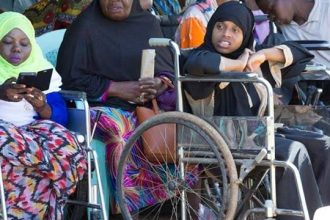Mediaage NG News – ABUJA, Nigeria (Wednesday 19th June, 2024)
Nigeria’s Coordinating Minister of Health and Social Welfare has said there’s hope for those living with Sickle Cell Disease (SCD), considering the various challenges it pose not just to those born and living with it but, to the social and well-being of affected countries like Nigeria.
“This will aid their quest for access to quality care right from birth and throughout life”, Prof Muhammad Ali Pate said on Wednesday in an event marking the 2024 World Sickle Cell Day, in Abuja, the country’s capital.
“This day gives us a unique opportunity to shed light on awareness on the increasing burden of SCD and eliminate the negative notion associated with it as well as building synergy with civil society organizations, international institutions and development partners towards the prevention, control and management of the disease, ensuring that those living with it have the hope of surviving, with an improved quality of life”, Prof Pate stated.
Represented by Dr. Chukwuma Anyike, Director, Public Health, the Minister said available records show that SCD affects nearly 100 million persons globally and is also responsible for over 50% of deaths in those with the most severe form of the disease (Hb SS).
“It is the most prevalent genetic disease in the WHO African Region. In many countries of the region including Nigeria, 10%–40% of the population carries the sickle-cell gene resulting in estimated SCD prevalence of at least 2%, he said.
“The situation in the region also indicates that national policies and strategic action plans are inadequate; appropriate facilities and trained personnel are scarce; adequate diagnostic tools and treatments are insufficient, as well as synergy amongst various stakeholders and NGOs in the prevention and control of the disease”, he added.
He also said in Nigeria, SCD contributes significantly to both child and adult morbidity and mortality and said the country stands out as the most Sickle Cell Disease endemic country in Africa and globally, ahead of India and Democratic Republic of Congo.
He added that in recognition of the huge burden SCD, the socio-economic and psychological effects of the disease, the Nigerian government is still intent on employing some already existing strategic intervention plans that include the first national NCD survey which was conducted in 1990, first national guidelines for the prevention and control of the disease, training of Primary Health Care (PHC) workers for the implementation of the Universal Newborn Screening for SCD policy in the South-West geopolitical zone of the country, amongst others.
According to him, plans are in motion to revitalization and re-position the six SCD centres for improved service delivery and access to care for those living with the disease, deploy the newly validated, efficient and cost-effective Point of Care screening methods that detects SCD in newborn as well as in other age groups as a first line screening method at different levels of health care, and integrate SCD care and services into the maternal and child health services, especially at the primary and secondary levels of healthcare in to improve early identification of cases and enrolment into the comprehensive care for SCD.
Representative from the World Health Organisation (WHO), Dr. Kelias Msyamboza said the SCD is a social economic threat that affects mostly children and commands urgent attention to the regions and families faced with the disease.
He said on average, over a thousand children are born daily with the sickle cell disease and more than half the children die before the age of five.
The World Sickle Cell Day is a date set by thr United Nations to raise awareness for the prevention and control of the disease amongst health care workers, professionals and people living with the ailment.






